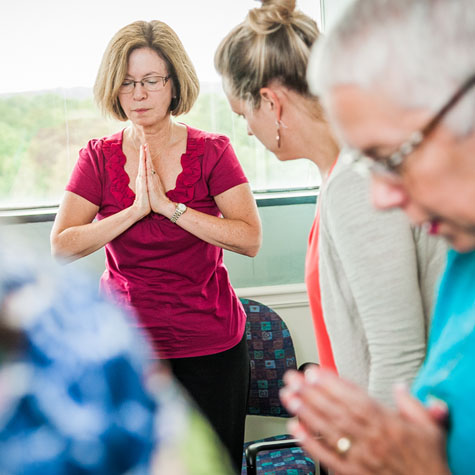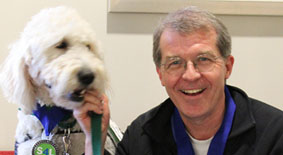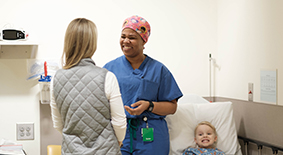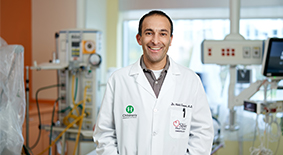Cancer Survivor Program Team Recharges
When stress levels rise, the Cancer Survivor Program team at the Aflac Cancer and Blood Disorders Center of Children's transforms a small conference room into a meditation oasis, rich with essential oil aromatherapy, a calming sound machine and seated yoga stretches.
Located in the Aflac Cancer and Blood Disorders Center of Children’s Healthcare of Atlanta on the fifth floor of the Medical Office Building at Scottish Rite Hospital is a small conference room typically used for meetings and quick conversations. However, when stress levels rise, the Cancer Survivor Program team transforms the space into a meditation oasis, rich with essential oil aromatherapy, a calming sound machine and seated yoga stretches.
Often led by Lillian Meacham, MD, Medical Program Director of the Cancer Survivor Program at Children’s, clinic staff members gather for 15-minute mental and physical restoration sessions. Drawing from the core theme of energy management in a corporate athlete training course, the team has recognized the need to restore energy among staff by taking a recovery break.
“Long days can take a toll, and you can become exhausted with little energy to give at home,” Dr. Meacham says. “If we were going to do anything to break the cycle, I knew that we needed to plan time for ourselves.”
The Cancer Survivor Program, founded in 2001, follows more than 1,500 childhood cancer survivors who are at least two years off of therapy. By positioning the break at the halfway point between morning and afternoon clinic, Dr. Meacham describes the practice as “washing away the morning and breathing in the afternoon.”
“You can’t keep making withdrawals without putting something else in,” Dr. Meacham says of hectic workdays. “We all look forward to our break, and it makes such a difference in how we feel that day. I really want everyone to feel recovered.”
Beyond the practice of seated chair yoga, the group takes wellness walks around the Scottish Rite campus and celebrates birthdays with great office fanfare. Dr. Meacham added that the team embraces laughing and breathing together as quick and effective breaks throughout the day.
“I do this with the team because I’m trying to say that their wellness is important to me too,” she says. “In medicine, there are a lot of opportunities for energy expenditure without recovery. But the better we take care of ourselves, the happier we’ll be.”
What is her advice for physicians who want to implement recovery breaks for themselves and their teams?
“Live by example,” Dr. Meacham says. “To benefit the team and to benefit the patients, you have to live it too.”

Learn how to take care of your mental, emotional and social wellness.
Check out these resources to help you prioritize your mental, emotional and social well-being.
Learn More

